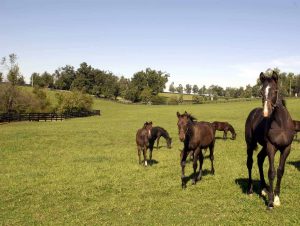Genetic Testing Options Expanded for APHA Horses in 2012
Testing options include a comprehensive coat color package and a comprehensive disease diagnostic package.
Testing options include a comprehensive coat color package and a comprehensive disease diagnostic package.
The APHA has introduced the University of California, Davis, as its official genetic testing provider.

Grade horses provide a great pool of genetic variation and generally lack many of the genetic diseases that currently can afflict purebreds.

Geneticists have created tools and tests that help horse breeders select for healthy foals. Furthermore, access to the equine genome means scientists can examine common diseases and conditions and find ways to prevent (and one day treat) them.
We’ve had bad news following bad news lately with the loss of some of the top horses in equestrian
At the 2006 American Association of Equine Practitioners Convention, Dr. Sharon Spier spoke about HYPP.
Stephanie Valberg, DVM, PhD, professor of large animal medicine and director of the University of Minnesota’s Equine Center, began the in-depth seminar on muscle disorders by discussing diagnosis of muscle disorders, beginning with a careful
Sharon Spier, DVM, Dipl. ACVIM, PhD, associate professor at the University of California, Davis, has pioneered much of the research on HYPP. She presented updated information gleaned over the past 14 years on this disease at the 2006 AAEP
Careful inspection of a horse’s muscle mass and symmetry and hands-on palpation educates the examiner about the horse’s muscle tone and comfort level. The examiner also evaluates the horse in motion and conducts a full lameness exam.

In this article, we’ll take a look at how equine muscles function and are nourished, as well as examine some of the problems that have surfaced, such as hyperkalemic periodic paralysis (HYPP) and tying-up.
Dietary management can work like magic for specific equine diseases.
Many DNA sequence variations are fine; they just give rise to the broad spectrum of colors, sizes, and other characteristics we see in the horse population. Some variations, however, cause problems. These might range from a genetic predisposition
They gave the muscular Quarter Horse colt an ambitious name: Impressive. He lived up to the name in such dramatic fashion that it became a household word in Quarter Horse circles – especially among breeders and exhibitors involved in showing
Is it safe to breed a Quarter Horse mare N/H (heterozygous) for hyperkalemic periodic paralysis (HYPP)?
Genetic testing in horses helps us learn about their physical characteristics, diseases, and much more.
Progress in the field of genetics has been moving by leaps and bounds during the past few years. It wasn’t long ago that researchers discovered ways to unravel and study DNA, that elusive strand of genes that inhabits each and
Stay on top of the most recent Horse Health news with
© 2022 Copyright Statement dolor sit amet, consetetur sadipscing User Terms, sed diam nonumy eirmod tempor invidunt ut labore et dolore magna aliquyam erat, sed diam voluptua. At vero eos et accusam et justo duo dolores et ea rebum. Stet clita kasd gubergren, no sea takimata sanctus est Lorem ipsum dolor sit amet.
"*" indicates required fields